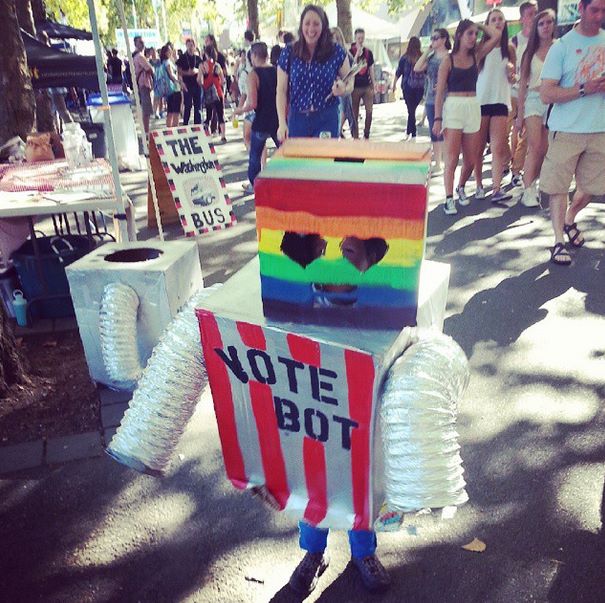This week’s special edition of Thirsty Thursday is brought to you by former Bus staffer, Candidate Survivor 2017 panelist, and current CID Public Safety Coordinator Sonny Nguyen. #knowledgeresponsibly
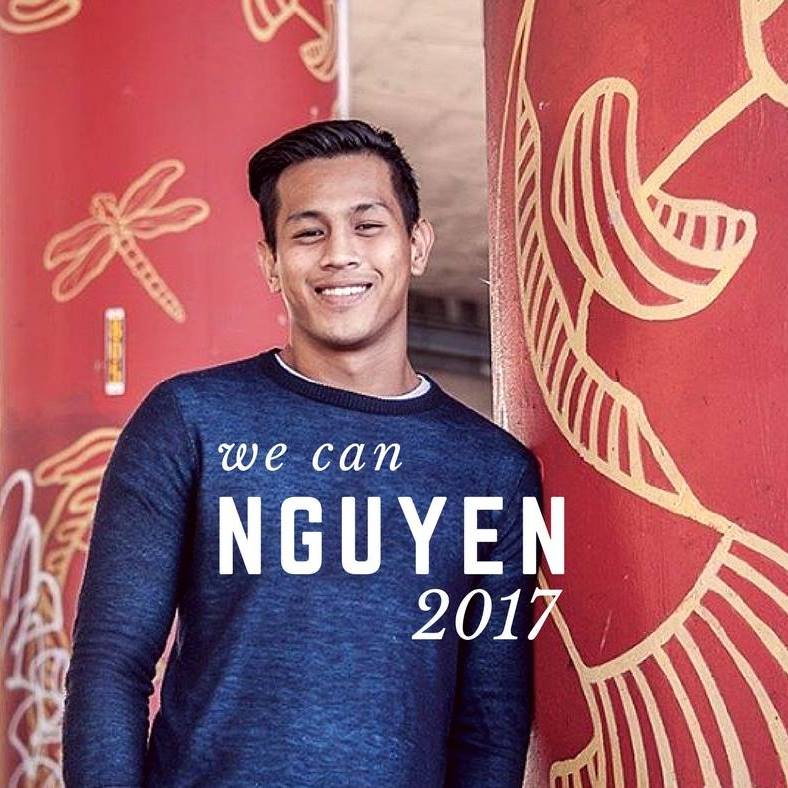
Everybody in this city is running for mayor. Back in May, after Mayor Murray withdrew his campaign for reelection, mayoral candidacies became more ubiquitous than fidget spinners. Seriously, from Larry “Oh Boy!” Oberto to the guy who Nazi salutes the city councilmembers, we have enough mayoral candidates in this city to fill a usually nearly-empty First Hill Streetcar.
Now, I am nothing if not a trendspotter. After much consideration, I decided I couldn’t be the only person in Seattle without a campaign launch party. Imagine the embarrassment! So, as anyone would do, I jokingly announced a write-in campaign to run for mayor.
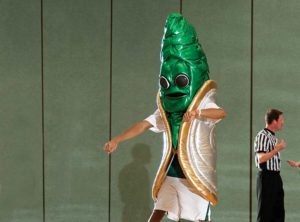
Photo Credit: The Evergreen State College
At least, it started out as a joke. And then things got weird. Since then, it’s become a weird performance art piece about the state of municipal elections because I went to Evergreen and that’s just what happens for us. (I think my entire college was just an elaborate performance art piece about academia or something..)
Anyway, throughout the last two months of fake-campaigning for real-life mayor, here are the things I’ve learned about running for office.
1. Running for office is super expensive.
It can costs upwards of half a million dollars to win a mayoral race in Seattle. For those of us in student loan debt, that number looks like this: $500,000. Where does that money go? Campaign staff and consultants, mailers, facilities rentals for events, all kinds of stuff. In fact, filing to run for mayor can cost about $2,000 alone. Unfortunately, I did not have $500k waiting to be spent (see above re: student loan debt) but neither do most people running for office. That’s why we have programs like the democracy vouchers for use in municipal (i.e. city) races, to close the gap between people who have or can raise that kind of money and people who don’t have as much easy access to that kind of money.
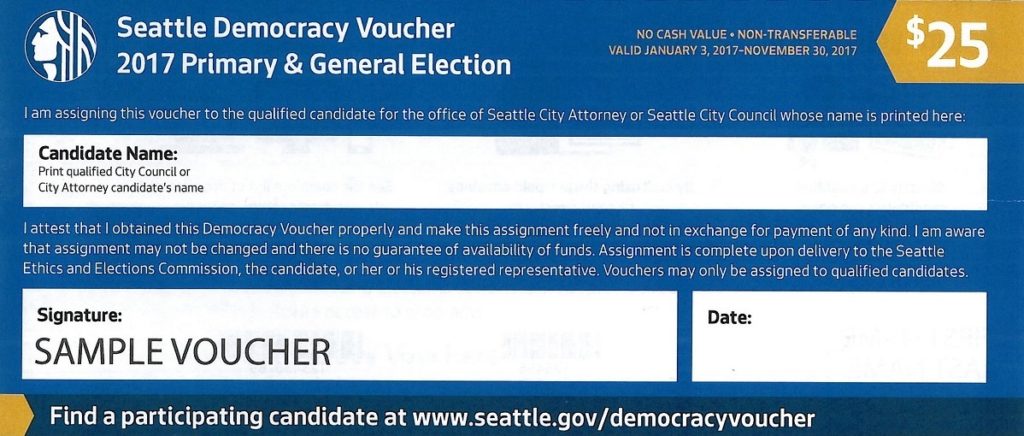
Photo Credit: Fuse WA
(My only disappointment with the program is that Democracy Vouchers don’t come in lower denominations, making us mostly unable to make it rain stacks on candidates.)
Fortunately or unfortunately for me, I have years of practice living on a shoestring budget. I printed my hundreds of campaign stickers on Avery nametags that I got from Prime Now with a coupon code and gift card. I got over 100 bottles of beer donated to me for my campaign launch party. I borrowed a button maker to make campaign buttons. I printed my yard signs on the biggest sheets of paper my office’s printer could handle, and gluesticked them on to cut up boxes that once held ice cream sandwiches. All in all, I spent about $80 on my campaign materials, that’s a total saving so far of $794,657 compared to Ed Murray’s 2013 campaign.
2. I am excellent at campaigning.
I worked with the Washington Bus for about 10 years, so I knew my way around a campaign. I’ve spent many summers surrounded by stressed out candidates and campaign managers, and I’ve gotta say this was much easier than I thought. Maybe it’s because I’m not trying to win, but most of campaigning was just hanging out at events and being charming. Aside from filling out surveys and raising money, it’s pretty much just flirting with an entire city and I am an excellent flirt.
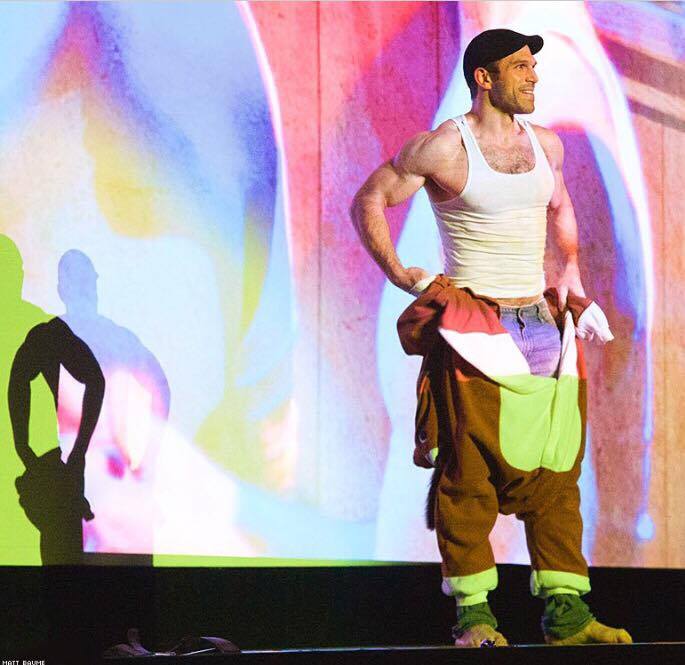
Photo Credit: CityArts
< But probably not as good a flirt as City Council Position 8 candidate, Dr. Hisam Goueli. Woof.
A lot of campaigning is learning how to make any conversation about you and what you can do. As someone who grew up in a household with seven other kids, this comes naturally. When you’re competing for attention with that many other people, you either learn to be proud of your own accomplishments or seek out new ways to gain external validation. And I ran a fake campaign for mayor, so you can guess which path I chose.
But this isn’t a blog post about my childhood development. This is a blog about Hisam Goueli’s delts. Or something.
3. Campaign events don’t need to be stuffy and boring.
Not every campaign event needs to be a no-host cocktail hour where strangers have to make small talk or a listening session in a rented conference room. And not every candidate forum needs to be the same questions with the same audience.
Were you at Candidate Survivor? If you were, I don’t need to explain this to you. If you weren’t, well, #vapeflute explains it all.
4. There’s no excuse for ugly campaign aesthetics.
Can we talk about this? Can we talk about how boring campaign materials look? My graphic design experience peaked at high school Yearbook Editor, and yet I must say I’ve got some of the best campaign materials of any candidate – real or otherwise. I made them on Canva! The free version!

(This post not sponsored by Canva. But it can be. Hit me up, Canva marketing team.)
5. Seattle wants young progressive candidates.
You would think that with 21 people making it to the ballot, we would have enough variety in candidates to call ourselves covered for the mayor’s race. It turns out people were actually super stoked to hear my (fake) announcement. Before finding out it was fake, people were offering to host fundraisers and events for me, connect me to possible endorsements, and even pay my filing fee!
And only partly because I’m incredibly charming. It was mostly because Seattle needs more young progressive candidates. Yes, we have a few already in this race and in others this year. Still, I learned you can never have too many passionate young people with a vision for the city’s future.
All across the state this year, we’ve seen amazing young candidates running for office. From Seattle School Boards to Federal Way City Council and beyond, we’re running tough races to make a difference (and almost all of them real!). It counters the mythos that millennials are dispassionate selfish jerks who only care about MTV skinny jeans and killing the diamond industry by saying “Look. We’re here and we love our local communities and we have these great ideas about how to make it better. Also we apparently don’t by napkins and I guess that’s a problem.”
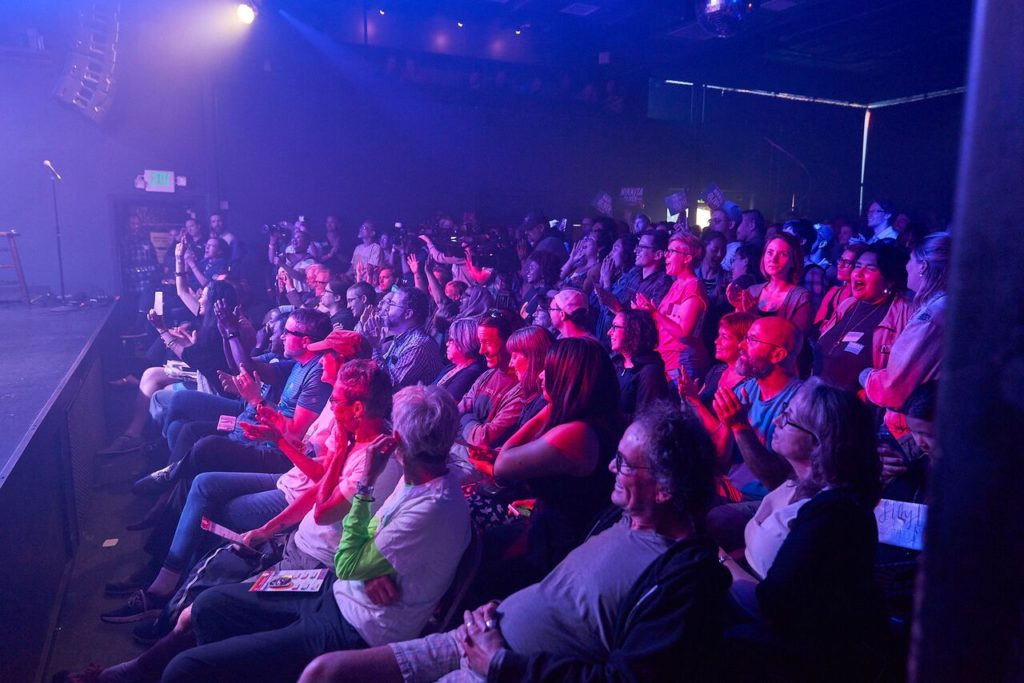
A packed Neumos full of mostly Millenials, ready to meet their candidates instead of playing golf.
6. You should run for office.
I mean, why not? We’ve created this idea that a candidate has to know everything about everything, but candidates are real humans who are constantly learning about the issues and building teams of experts around them. You know how to do that. You know how to make friends, be charming, and speak from the heart.
There are people and organizations out there that will donate to your campaign. There are people and organizations out there that want to hear your ideas for improving your community. You can ask your county elections office what seats will be opening up next year and start planning now, or reach out to organizations like unions, churches, or Amplify for resources. Amplify, as stated on their website, “recruits, trains, elects, and supports progressive champions for state and local office in the Northwest, prioritizing people of color, women, young people, and LGBTQ candidates.”
Sure, I didn’t actually run for office this time around. The most important thing I learned, however, is that the idea of my candidacy isn’t absurd enough to be an obvious joke. It’s a plausibility, a possibility, and with each passing day, a growing likelihood. I know now more than ever that you don’t run for office because you think you’re the best person for the job. You run for office because you know that the communities you’re a part of and that you have connections with, they deserve a voice. You run because there are issues that need to be talked about and nobody else will start those conversations. You run because if you don’t, who’s like you that will?
So do it. Run a mayoral campaign on $80 or raise $800,000. Run for school board. Run for Insurance Commissioner (10 years in politics, still barely understand what the job does). Your community is waiting for you.
As more and more amazing young people run for office, I become more and more sure that together, #WeCanNguyen.
